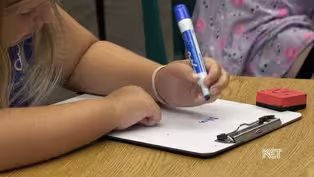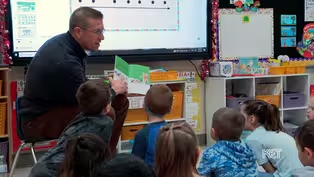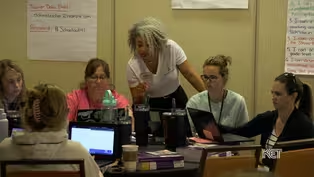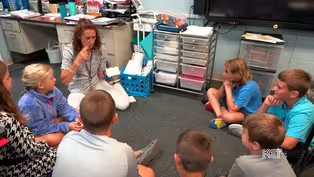
The Read To Succeed Act
Clip: Season 2 Episode 127 | 3m 11sVideo has Closed Captions
When the General Assembly passed the Read to Succeed Act last year, this phonics-based ...
When the General Assembly passed the Read to Succeed Act last year, this phonics-based approach to teaching became a requirement for all school districts.
Problems playing video? | Closed Captioning Feedback
Problems playing video? | Closed Captioning Feedback
Kentucky Edition is a local public television program presented by KET

The Read To Succeed Act
Clip: Season 2 Episode 127 | 3m 11sVideo has Closed Captions
When the General Assembly passed the Read to Succeed Act last year, this phonics-based approach to teaching became a requirement for all school districts.
Problems playing video? | Closed Captioning Feedback
How to Watch Kentucky Edition
Kentucky Edition is available to stream on pbs.org and the free PBS App, available on iPhone, Apple TV, Android TV, Android smartphones, Amazon Fire TV, Amazon Fire Tablet, Roku, Samsung Smart TV, and Vizio.
Providing Support for PBS.org
Learn Moreabout PBS online sponsorshipWhen the Kentucky General Assembly passed the read to Succeed Act last year, this phonics based approach to teaching became a requirement for all school districts.
Two of the sponsors of what was called Senate Bill nine State Senator Stephen West of Paris and State Representative James Tipton of Taylorsville were on the panel of experts on our early learners reform that was held earlier this fall, along with Christy Biggerstaff, director of early literacy with the Kentucky Department of Education's Office of Teaching and Learning.
They talked about what's included in the legislation and why teachers say they are excited about the change.
We have an oversight responsibility in the legislature.
60% of our state budget goes to education, and we had looked at our NAEP scores when KERA first came out in 93.
We we had seen a pretty significant increase, but that had plateaued and our scores were on the decline.
And we knew something had to change, something was not working in Kentucky and something was not working in our economically depressed areas west into Louisville or other places.
So we realized that something had to change quickly, and we worked for several years to get Senate Bill nine across the finish line.
There are different parts of this legislation.
What are the first part is what I'll refer to as the universal screener.
We have to know where the children are so we required the districts to use and we used the term evidence based.
We think that's key.
It has to be evidence based.
Universal screeners were to be selected to be to identify these students, students that were identified as potentially having problem.
The next phase is a diagnostic assessment.
And not only do we have to have the correct tool, the teachers have to be trained on how to use that tool.
So that's part of the legislation.
I think another key component of this legislation is we recognize that most of our teachers have not been trained in science of reading.
So it is essential that we have professional development and that's where the letters program came in.
It's the foundational learning.
It's how the brain learns to read.
It's information that our teachers have been asking for and have been desperately seeking for a long time.
And I hear that from a lot of the participants in the letters cohort saying, you know, this is the professional development that I never knew I needed.
And now that I have it, I'm so excited to put it into place.
But the letters instruction goes through the components of literacy, the phonemic awareness, phonics, vocabulary, comprehension and fluency, and really teaches our teachers how to teach reading how the brain works.
You know, as he was talking about the science behind all of that information, because once you know the how and you understand the why and the why, it really becomes apparent.
So that's really essentially what the letters program is doing for our teachers.
It's teaching them how to teach reading.
Kentucky’s Literacy Curriculum Requirements
Video has Closed Captions
Clip: S2 Ep127 | 6m 43s | Legislation passed last year requires all Kentucky school districts to adopt literacy ... (6m 43s)
One Student’s Path to Better Reading
Video has Closed Captions
Clip: S2 Ep127 | 4m 1s | The 2023 Kentucky School Report Card and a recent report by the National Assessment of ... (4m 1s)
Video has Closed Captions
Clip: S2 Ep127 | 4m 9s | "Real Men Read,” a United Way literacy initiative in Somerset, enlists role models who ... (4m 9s)
Teachers Learning to Teach Reading
Video has Closed Captions
Clip: S2 Ep127 | 2m 36s | Before the start of the school year, almost 3,000 Jefferson County teachers were ... (2m 36s)
“The Science of Reading” in Action
Video has Closed Captions
Clip: S2 Ep127 | 4m 44s | Hancock County has been teaching “the science of reading” for some time, allowing us to... (4m 44s)
Providing Support for PBS.org
Learn Moreabout PBS online sponsorship
- News and Public Affairs

Top journalists deliver compelling original analysis of the hour's headlines.

- News and Public Affairs

FRONTLINE is investigative journalism that questions, explains and changes our world.












Support for PBS provided by:
Kentucky Edition is a local public television program presented by KET




